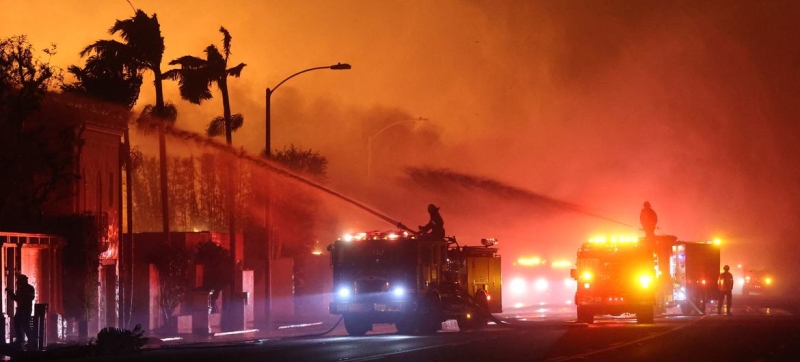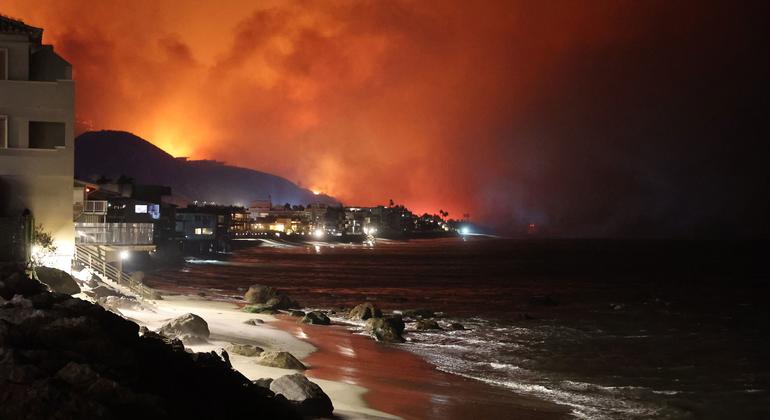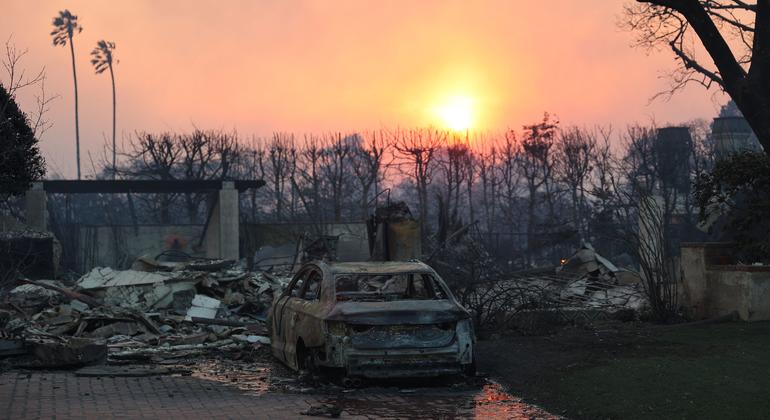
Firefighters battle a wildfire near Los Angeles, California. INTERVIEW | UN expert on whether catastrophic wildfires can be avoided Climate and Environment
The wildfires in southern California, which are estimated to cause $250-275 billion in damage, have once again drawn public attention to the need to predict and prevent natural disasters of this scale. UN News discussed the topic with Amy Duchelle, senior forestry officer at the Food and Agriculture Organization of the United Nations (FAO).
Amy Duchelle: For a wildfire to start, three things need to come together: the presence of natural fuels, hot, dry weather, and an ignition source. As we know, Los Angeles had all three of these ingredients, plus high winds that quickly caused the fires to burn out of control.
Fire is nothing new to humanity. Controlled fires have been used by humans for thousands of years as a traditional land and agricultural management tool among smallholders and indigenous peoples, especially in developing countries.
Fire has been part of the Earth’s natural system for hundreds of millions of years and on every continent except Antarctica. However, its behavior is now changing in terms of the intensity, frequency, and duration of extreme wildfires.
An estimated 340 to 370 million hectares of land on Earth are burned by fire each year, including about 67 million hectares of forested land. Landscape fires are rapidly increasing in intensity, scale, and duration due to climate change and poor land management.
Many now argue that we have entered a new era of catastrophic wildfires driven by climate change, and therefore the approach to mitigating them must be different, with much more effort and investment directed toward prevention.

UN News Service: You mentioned the role of climate change in wildfires. The World Meteorological Organization recently confirmed that 2024 was the hottest year on record. As you said, we have entered a new era. That is, in the future we will see even more forest fires – stronger and longer lasting?
ED:Forecasts show a significant increase in the intensity, frequency and size of wildfires in the coming years. This is of great concern, not least because wildfires are not only fueled by a warmer climate, but they also release CO2 into the atmosphere, which in turn further exacerbates the climate crisis. It is becoming a vicious circle from which it is difficult to break.
UN News Service: What is the Food and Agriculture Organization doing about it?
ED: FAO has a long-term programme to promote integrated fire management, and we are trying to do exactly what I was talking about earlier – prevention. Our approach has five steps. The first is to review and analyse the fire situation in a given country or region. The second is to work to reduce the risk of a destructive wildfire. The third is to be prepared to act in accordance with protocols and procedures developed in the event of a wildfire. The fourth is the actual response to the situation, which is fire suppression. In the fifth step, we are working on restoration – not only of damaged infrastructure and urban areas, but also of natural ecosystems.
UN News Service: One of the things you mentioned concerns fire suppression itself. In your opinion, should countries change their current methods of fighting fires??
ED:I think the Los Angeles fires have highlighted the limits of our ability to fight fires when they get out of control. You can have the best fire suppression system in the world, and California is known for its best practices in this area, and you still can’t handle fires. That’s why we need to shift our focus to prevention, risk reduction, and preparedness. The damage and loss from these types of disasters is in the billions of dollars. Large financial investments in prevention have the potential to reduce response and recovery costs.

UN News Service: In terms of prevention, risk reduction and preparedness, is there anything the general public can do?
ED: Fires are a societal issue, and everyone has a role to play. Most fires are initially caused by human activity, whether it’s accidents, or carelessness, or infrastructure deficiencies. There are ways to manage fires in an integrated way, where everyone is involved. I work in forestry, and it’s clear to me that wildfires are not just a forestry issue, but an issue for all sectors and all levels of society.
UN News Service: Thank you very much for this interview! Is there anything else you would like to share about the work on forest fire prevention??
ED: What we have been working on for the last few years is the Global Fire Management Hub. This project was initially launched by FAO and UN Environment in 2023. The main objective of the fire hub is to bring together key partners – both in the UN system and in NGOs, government agencies, civil society organizations, indigenous peoples’ organizations – to work together and build capacity for integrated fire management around the world. Fire management is not a new science. By learning from the past and working together in the new reality, we will find ways to solve the problem of forest fires.
